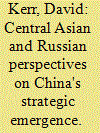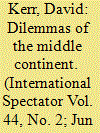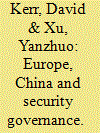| Srl | Item |
| 1 |
ID:
095120


|
|
|
|
|
| Publication |
2010.
|
| Summary/Abstract |
This article employs fieldwork research and literature analysis to examine contemporary perceptions of China's emergence in popular and elite opinion in Russia and the Central Asian states, particularly Kazakhstan. It initially establishes a framework for understanding China's emergence, emphasizing a trilateral dynamic between the hegemonic position of the US in Asia, the evolution of the strategic choices of China's neighbours and the development of strategic regionalism as a mechanism for managing regional spaces. Choosing to take the Commonwealth of Independent States as a particular case of this framework, it argues that the interaction between Russia, China and the US remains highly fluid, particularly under the conditions 'of re-setting' the US-Russian relationship. This means that regional contexts are highly significant; and it establishes Central Asia as an important new strategic region for working out relations between Russia, China, and the US through their interactions with regional states. The second part of the article examines Russian and Central Asian responses to China's emergence. It looks at three categories of motivation in China's regionalism: its system for accumulative growth; its problems with weak constitutionality and transnational security in its western regions; and its concern with US/NATO encroachment on its western frontier and the US attempt to turn Central Asian elites away from their traditional alignments. The third part looks at China's promotion of the Shanghai Cooperation Organisation (SCO) as its mechanism for strategic regionalism in Central Asia. The article questions the SCO's significance in terms of its capacity for governance and functionalism, and points to the problem of institutional competition, notably with Moscow's preferred structure of the Collective Security Treaty Organization. The article concludes that China will be an unconventional superpower that presents different facets of itself in different regional contexts. There will not be a single model of China's emergence and it will continue to develop its international role through a mix of adaptation and experimentation. However, China's strategy will pose a problem for Russia and Central Asia since it seeks to create a strategic space that does not challenge the West, but exists substantially outside the West. Russia, in particular, has to decide whether it will be able to maintain its current stance of independence between Europe and Asia as China's rise shifts the frontiers between East and West.
|
|
|
|
|
|
|
|
|
|
|
|
|
|
|
|
| 2 |
ID:
080735


|
|
|
|
|
| Publication |
2008.
|
| Summary/Abstract |
Asia is not a Westphalian system. Transnational politics, in which political communities are subdivided by nominally sovereign boundaries, are just as common in Asia as international politics. This non-Westphalianism is also a persistent feature of Asian security, as subnational, transnational, and international conflicts are embedded in each other. This article examines China's security relations with Central Asia in terms of these features, beginning with a discussion of the developmental and ethno-national politics of China's Xinjiang Uyghur Autonomous Region. The Chinese state has advanced a program of economic modernization and intensive security campaigns to eradicate what it terms the "three evils" of splittism, terrorism, and extremism and to promote a common political identity for modern China. But this campaign has resulted in a segregated Xinjiang in which Uyghurs still look to a transnational community outside of China as an alternative to political assimilation. The second part of the article examines the interaction between transnational and international security in Central Asia, and China's promotion of the Shanghai Cooperation Organization as its preferred mechanism for managing this relationship. The authors identify three aims of the SCO - repressing transnational radicalism; stabilizing regional regimes and their foreign policy orientations; and checking U.S. influence - but argue that these are more restraints on the political options of others than a means to expand China's own options. The fact that the problems of China's transnational regions and the future of SCO remain unresolved leads the authors to conclude that an ascendant China faces an uncertain future in the fluid environment of Central Eurasia.
|
|
|
|
|
|
|
|
|
|
|
|
|
|
|
|
| 3 |
ID:
089149


|
|
|
|
|
| Publication |
2009.
|
| Summary/Abstract |
Russia did not join the West, nor did it join the East. Russia's commitment to its strategic autonomy and independent foreign and security policy requires the preservation of a 'middle continent' that bridges and transcends Europe and Asia. Russia pursues a restorationist strategy for Eurasia but faces a three-way struggle: for its own autonomy as a great power; for resistance to absorption within the US-centred system of common strategic space; and for management of the dynamics between the emergent powers through negotiation between strategic partnerships and regionalisms. These dilemmas are even more complicated in relation to Eastern Eurasia, and in particular the Sino-Russian relationship.
|
|
|
|
|
|
|
|
|
|
|
|
|
|
|
|
| 4 |
ID:
129638


|
|
|
|
|
| Publication |
2014.
|
| Summary/Abstract |
Normative power can be defined as the ability to govern interdependencies by means of rules, regimes and compliance strategies. This paper presents two case studies in security governance-international responsibility to protect in Sudan and counter-proliferation policies towards Iran's nuclear programme-to evaluate the degree of normative convergence between China and Europe. It concludes that there are still major differences between Europe and China on employing normative strategies in security governance but that both modes of governance and identities as security actors are mobile so that the trend is towards convergence, albeit with some distance still to travel.
|
|
|
|
|
|
|
|
|
|
|
|
|
|
|
|
| 5 |
ID:
061265


|
|
|
| 6 |
ID:
065003


|
|
|